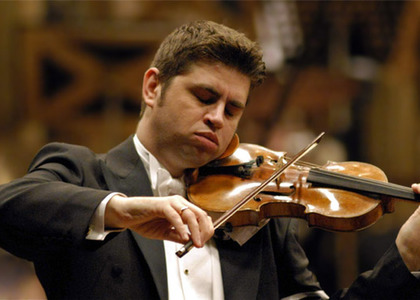> [Archived] Interviews

Interview with violinist Remus Azoiței
The "George Enescu" Philharmonic Symphony Orchestra, conducted by Italian conductor David Crescenzi, presents Ludwig van Beethoven's Concerto in D major for violin and orchestra, op. 61, with violinist Remus Azoiței as soloist. The concert can be enjoyed on Thursday and Friday, the 17th and 18th of March, at the Romanian Athenaeum.
Mr Remus Azoiței, on the 17th and 18th of March you will perform at the Romanian Athenaeum together with the "George Enescu" Philharmonic Orchestra. What does the "George Enescu" Philharmonic Orchestra mean to you, from the perspective of a violinist who has worked and continues to work with international orchestras?
Honestly, I'm looking forward to these concerts because they've been postponed twice because of the pandemic and we've all suffered from this misfortune that has befallen us all. We, the artists, have also been very badly hurt. Finally, I have the opportunity to return to the stage of the Athenaeum and perform the Beethoven Concert with my friends from the "George Enescu" Philharmonic. Half of that orchestra was in my school, practically. So, we are not only colleagues on stage, but also very good friends, beloved musicians and it is such a great joy for me to see them again and to perform music together and to reconnect with my audience in Bucharest! I understand that people are very excited about these concerts and I can't wait to step on stage again!
You will perform Ludwig van Beethoven's Concerto in D major for violin and orchestra, Op. 61. You have said that this is the only concerto you have performed in public only after the age of 40, when you felt fully mature to perform it properly. How do you perceive Beethoven's music now, compared to 20 years ago?
We are, of course, progressing - I hope we are progressing - over time. I would say I was right to perform it only after the age of 40, when I felt artistically mature. Technically, I was mature beforehand, but artistically... I would say that this work belongs to a completely mature performer, in control of his artistic capacities. Anyway, Beethoven - the violin concerto is, indeed, a peak in music, in the history of music in general, it is a work of very large dimensions (almost 50 minutes) and with absolutely outstanding technical and musical difficulties. Beethoven is Beethoven, an incredible composer, and every performer has difficulties with him, because Beethoven never compromised on the technicality and artistic power of his creations.He wanted everything from the performers, because his music is complete, really. In fact, over these months we, the Ad Libitum Quartet, in Iași, are putting together a Beethoven Complete Works collection and we have reached the late quartets, from opus 127 to the last opus, 135. There are some musical cathedrals there and all these efforts together with the quartet are enlightening my solo performances also in the violin concerto. I can feel it! Although I've played the Beethoven Concerto with the Philharmonic at the Athenaeum before, I think it's going to be something special now.
The Bucharest concert takes place after being postponed twice due to the pandemic conditions. You will be joined on stage by conductor David Crescenzi. Will this be the first time you've collaborated?
Yes, I've never met him before, but I know of him and I'm looking forward to a great concert.
The programme will be rounded off with Robert Schumann's Symphony No.1 in B flat major,Op.38, Spring. How do you see the two works coming together in the programme?
We are dealing with a total classic, which is Beethoven, and an early romantic, which is Schumann - two great works, of great contrast in style, form and musical language. The organisers of the "George Enescu" Philharmonic were very inspired, I think.
In another interview, you mention that no online playback of a concert will ever match that electricity in the air that settles in a room with an audience. Why is the experience of being in the hall at this concert a must for Romanian audiences?
For several reasons. Every time I step on the stage of the Athenaeum, the audience is very enthusiastic. Even though the audience has access to my recordings on YouTube or records, they come and they want to see me, they want to taste the unique experience that they are offered then, in that moment, in that hall. And, after all, I don't think music was created to be played in online environments as much as it was created to be delivered directly from the performer to the hearts of the people in the audience. So I don't think one can be compared to the other. We're going live, face to face, and I can't wait!
Translated by Lenuța Bejenaru,
University of Bucharest, Faculty of Foreign Languages and Literatures, MTTLC, year I
Corrected by Silvia Petrescu














